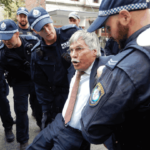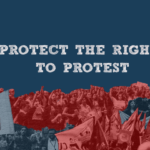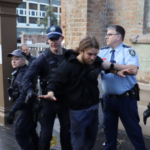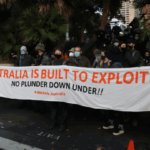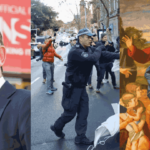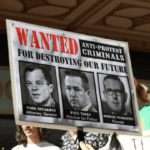Civil Society Demands NSW Government Revoke Authoritarian Antiprotest Regime
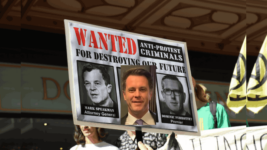
The first of April marked the two-year anniversary of the NSW government’s draconian antiprotest regime, which has effectively stamped out unsanctioned civil disobedience actions that cause public disruptions in order to raise public awareness to drastic issues not being addressed by government.
Then NSW premier Dominic Perrottet rushed to pass these measures because climate defenders, both Fireproof Australia and Blockade Australia, were running two extremely effective nonviolent direct action campaigns, that a hell of a lot of constituents were talking about.
The Liberals took issue, as both majors are so embroiled in the fossil fuel industry that, despite 20 percent of mainland forest recently burning down, which was then followed by unprecedented rain events, they’re attempting to keep the escalating climate crisis a secret to secure future profits.
The way the laws were jammed through was further notable, as the then transport minister decided to pass the draconian penalties that now apply to unauthorised protest while on-air with a 2GB shock jock feeding her the solution, with a similar AM tactic later being taken in South Australia.
Yet now, two years on, a NSW Labor government is in power, and while it did vote the laws through in opposition, a coalition of civil society groups, led by the NSW Council for Civil Liberties has joined forces to call on NSW premier Chris Minns to make a required review of the regime transparent.
With a view to repeal
“Two years on from the introduction of the draconian 2022 antiprotest laws, these laws are creating a chilling effect on civil movements and social progress,” reads an open letter, published last week, that was addressed to Minns, attorney general Michael Daley and roads minister John Graham.
“The barriers for a diverse range of groups to participate in protest action have been raised to an unattainable height, due to risk of police interaction and escalated police violence, especially for groups such as First Nations people and individuals on temporary visas.”
Along with NSWCCL, the 30-odd coalition includes Australian Democracy Network, Redfern Legal Centre, National Justice Project, Wage Peace, Australian Lawyers for Human Rights, the Australian Palestine Network, the Maritime Union of Australia, APAN and the Socialist Alliance.
The organisations have stipulated that as per the legislated requirement, the AG’s office and Transport for NSW has to review the laws, and they want Minns to ensure this doesn’t take place behind closed doors but is conducted in a transparent manner, which includes seeking submissions.
The coalition was also clear about its ultimate aim, which is “the repeal of these antidemocratic laws”.
And the NSWCCL wrote on X last Friday afternoon that the Minns government has confirmed “a public review into draconian antiprotest laws” will take place, allowing for the “opportunity for open and transparent public scrutiny”.
New style antidemocratic legislating
The NSW Greens too joined the coalition of civil society groups to call for the ultimate revoking of these laws. And the ever-growing Greens parliamentarians who signed the letter included MLCs Sue Higginson, Cate Faerhmann, Abigail Boyd, Dr Amanda Cohn and MPs Jenny Leong and Kobi Shetty.
Boyd told Sydney Criminal Lawyers directly after the laws had been passed in April 2022 that the way the NSW Liberal Nationals went about passing the drastic measures was “the most draconian thing” she’d “ever witnessed in NSW parliament”.
“What happened within a 48-hour period was these laws were introduced with very little consultation,” she explained. “They effectively abandoned debate in pushing through this legislation more quickly than any other substantial legislation that we’ve passed in this term of parliament.”
Perhaps better than a political debate in the chamber though, was then roads minister Natalie Ward getting on 2GB to tell Ben Fordham that she’d just been stuck in North Shore traffic due to a Fireproof Australia blockade, and the activists had made her late to work and kids late for school.
Fordham responded, “We’ve got to make sure that there are stiff penalties when this happens.” And he added that the actions were dangerous and disruptive, while the minister said people were fed up, especially with recent flooding, of which the climate-driven nature was being raised in protests.
“So, I’ll be looking at that. I agree with you, we need to make sure the penalties are really severe,” and with that bit of on-air legislating on the fly, two weeks later NSW had the most oppressive antiprotest regime around all thanks to a 2GB host, who luckily took the call from the minister.
And a preexisting offence under section 144G of the Roads Act 1993 (NSW) was expanded so obstructing a major bridge, tunnel or road can lead to 2 years prison and/or a fine of $22,000, while a new offence under section 214A of the Crimes Act 1900 (NSW), extended this to major facilities.
The authoritarian creep
In the civil society coalition’s joint statement last week, Wage Peace organiser Lilli Barto asserted that the “only reason for an MP to support these laws is if they believe that the voices of ordinary citizens have no place in governance and would rather not be bothered by them”.
And the long-term peace activist insisted that “any erosion of our democratic rights is also an expansion of police powers”, and, as while we “know the police are out of control”, the government just keeps “giving them more tools to criminalise people and lock them up”.
Barto’s assertions were dramatically witnessed when Fireproof Australia-Stop Fossil Fuel Subsidies and Blockade Australia, which had been conducting a series of rolling actions at Port Botany right before the laws changed, both determined to continue with actions.
Blockade Australia sought to launch a week of Sydney actions in June 2022, and NSW police countered it in an unprecedented manner, prior to the events, which included a raid on a Colo property, during actual events and over the days following events, which included raiding a picnic.
While Violet CoCo and other SFFS members blocked one lane on the Harbour Bridge, which led to the activist being the first sentenced under these laws. She received at least 8 months inside, which was dropped on appeal, only after another significant civil society coalition condemned her gaoling.
MUA Sydney Branch joined both civil society coalitions in condemning the antiprotest regime, and branch secretary Paul Keating pointed out last week that these laws are now being applied to union members “for peacefully taking part in protests at our workplaces, in our own port”.
At a demonstration before Sydney’s Downing Centre to protest CoCo’s imprisonment, union members warned then that these laws would soon be applied to them, and Keating added that six MUA members have just been charged under them, as have members from six other unions.
“The evidence speaks for itself: unionists are now facing prison because of these laws,” said Keating, in lending his voice to the statement calling on the Minns government to roll back the regime, which has since been mirrored in Victoria, Tasmania and South Australia.
“We descend into a dark place in Australia with these authoritarian and antidemocratic laws,” the MUA Sydney boss concluded. “It is our duty to fight these bad laws until they are abolished.”


